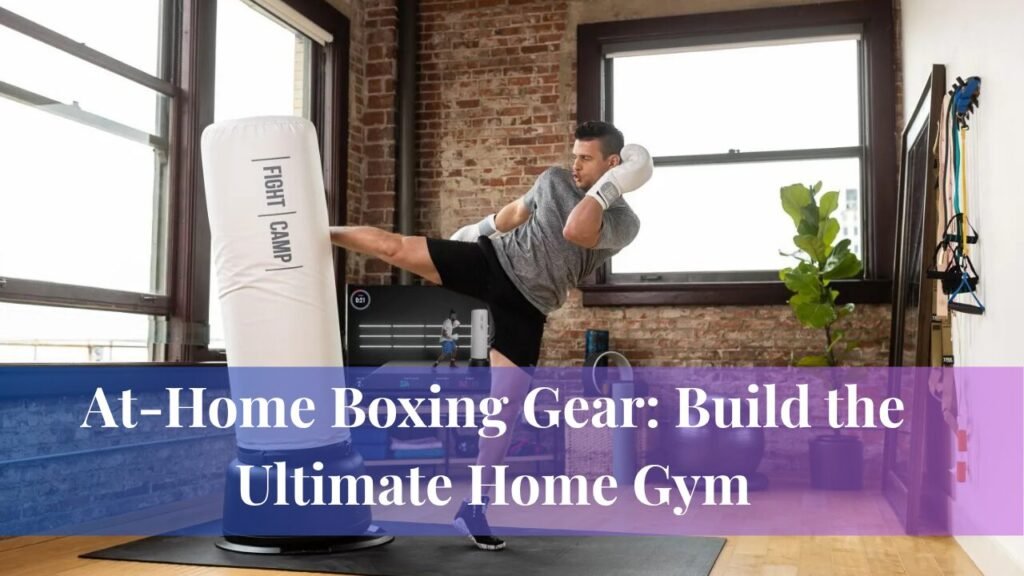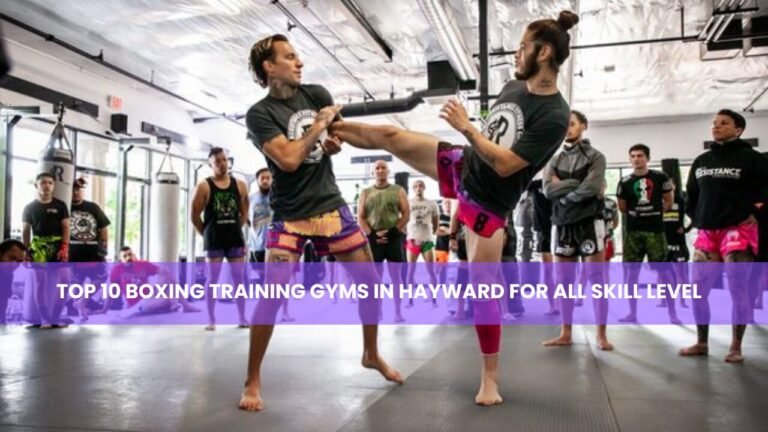Boxing isn’t just for professional fighters or fitness enthusiasts who frequent the gym. With the right at-home boxing gear, you can experience the same high-intensity workouts, mental focus, and physical improvements from the comfort of your home. Whether you’re new to boxing or a seasoned amateur, setting up a home boxing gym can be both rewarding and cost-effective. This guide explores everything you need to know about building your home boxing setup, including essential gear, setup tips, costs, and expert advice.
Why Choose Boxing at Home?
Boxing at home offers several benefits that make it a practical and appealing alternative to traditional gym training. One of the main advantages is convenience you can train anytime without worrying about gym hours or commute times. It also provides cost savings because a one-time investment in quality gear often outweighs ongoing monthly gym fees. Privacy is another factor, allowing you to practice and progress at your own pace without external pressure.
Home boxing is versatile, combining cardio, strength, coordination, and mental discipline in one workout. It can also be a family-friendly activity, giving everyone in the household a way to stay active together.
Key Benefits of Home Boxing Training
Training at home can be just as effective as gym-based workouts. It enhances cardiovascular endurance, builds lean muscle mass, and helps burn fat efficiently. Boxing also improves hand-eye coordination and reflexes while acting as an excellent stress reliever. Another often-overlooked benefit is the increase in discipline and mental toughness, qualities that extend beyond the sport into daily life.
Essential At-Home Boxing Gear
Creating a reliable setup starts with having the right equipment. Boxing gloves are the most essential item, and choosing the right weight and material is important for comfort and safety. Gloves generally come in different weights lighter ones for speed, mid-weight for general training, and heavier for bag work. Quality padding and durable materials, such as genuine leather or high-quality synthetic leather, are key for protection.
Hand wraps are equally important, as they support the small bones in your hands and stabilize your wrists. A standard length of 180 inches offers full coverage, and materials with slight elasticity provide a better fit. Punching bags come in various forms, including heavy bags for power, freestanding bags for flexibility in setup, and double-end bags for improving timing and accuracy. A jump rope is another boxing staple, enhancing rhythm, agility, and endurance.
Boxing Shoes and Floor Setup
Boxing shoes, while optional for casual training, can significantly improve your footwork and grip. They offer ankle stability, lightweight mobility, and better traction for quick movements and pivots. To protect your floor and joints, mats or padding are highly recommended. EVA foam tiles, roll-out mats, or shock-absorbing gym flooring can make a big difference in both safety and comfort.
Tools for Form and Training Rhythm
A mirror or camera setup is invaluable for self-assessment, allowing you to check and improve your form. For maintaining a professional training rhythm, a boxing timer or interval app can structure your workouts effectively. Popular timer apps include Boxing Interval Timer, Seconds Pro, and PunchLab, which help replicate the timing of real matches.
Optional but Useful Gear
As your training advances, you may want to expand your equipment selection. A speed bag sharpens timing, rhythm, and hand speed, while a reflex ball is a portable and fun way to boost accuracy and reaction time. Slip ropes or slip bags help develop head movement and defensive skills. Focus mitts or pads, used with a partner, allow for dynamic drills, and resistance bands can add intensity to punches and footwork, building shoulder endurance and power.
How to Set Up Your Home Boxing Gym
The first step is choosing your training space. Ideal locations include a garage, basement, spare bedroom, or even a backyard patio if weather allows. Aim for at least a 6×6-foot clear area, with good lighting and ventilation. Next, mount your equipment securely. Heavy bags require strong wall or ceiling mounts anchored into studs or concrete, while freestanding bags offer flexibility without permanent installation.
Adding flooring and wall protection is the next priority. Foam tiles or mats provide traction and cushioning, while corner pads or wall guards prevent damage. Finally, keep your space organized by storing gloves, wraps, and accessories on shelves or wall hooks. A clean and tidy setup not only improves safety but also makes training more enjoyable.
Costs of Building a Home Boxing Gym
Setting up a home boxing gym can be tailored to your budget. Gloves range from $30 to $120, while hand wraps are generally between $10 and $20. Punching bags vary depending on type, with heavy bags costing around $100 to $300 and freestanding bags between $150 and $350. Jump ropes are affordable, typically $10 to $30, and floor mats can range from $50 to $150. A mirror or camera setup can cost $20 to $100, and interval timer apps are often free or under $10. Overall, the total investment for a basic setup falls between $250 and $800, depending on your choices and preferred brands.
Trusted Brands for At-Home Boxing Gear
Choosing reputable brands ensures durability and better performance. Everlast is a classic choice for gloves, bags, and full kits, with strong customer reviews. TITLE Boxing offers professional-grade gear favored by serious athletes. RDX Sports is known for affordable yet reliable equipment, while Venum blends style with high performance. Ringside is another long-standing name in the boxing world, respected for its quality products.
Real User Experiences
Many home boxers have shared how this training approach has transformed their routines. James T. from the UK started with just a freestanding bag and gloves in his garage, eventually building a full setup that turned boxing into a daily habit. Carmen V. from London credited the reflex ball for helping her regain hand-eye coordination after a wrist injury, describing it as surprisingly addictive. Ravi P. from Manchester combined virtual boxing classes with his home gym setup and lost 10kg in six months.
Pro Tips for Home Boxers
A proper warm-up is crucial for preventing injuries, with jump rope and shadowboxing being excellent ways to activate muscles. Staying hydrated between rounds helps maintain performance levels. Tracking your progress, whether through recordings or fitness trackers, allows you to monitor improvements. Shadowboxing remains a valuable exercise for practicing form and footwork without equipment, and focusing on proper technique ensures that every punch is effective.
Frequently Asked Questions
What is the best beginner boxing gear for home?
For beginners, start with boxing gloves, hand wraps, a freestanding or heavy bag, jump rope, and floor mats.
Can I use a freestanding bag in a small apartment?
Yes. Freestanding bags are designed to fit in small spaces and do not require mounting. Use mats to reduce noise.
Do I need boxing shoes to train at home?
No, but they are beneficial. If not available, train barefoot or with lightweight, non-slip indoor shoes.
Is boxing good for weight loss?
Boxing burns up to 800 calories per hour, making it excellent for fat loss, especially when combined with a healthy diet.
How do I clean and maintain boxing gear?
- Wipe gloves after every session
- Air dry gear to prevent odor
- Wash wraps regularly
- Inspect equipment for damage every month
Conclusion
A solid home boxing setup is not just a luxury but a smart investment in your health, fitness, and mental discipline. With the right at home boxing gear, you can achieve professional-level results on your own schedule. Whether you’re throwing your first jab or mastering advanced combos, the tools outlined in this guide can help you reach your fitness goals.
Now that you know what gear you need, how to set up your space, and how to train effectively, it’s time to get started. Pick your gear, plan your workouts, and start enjoying the powerful benefits of boxing right from home.




